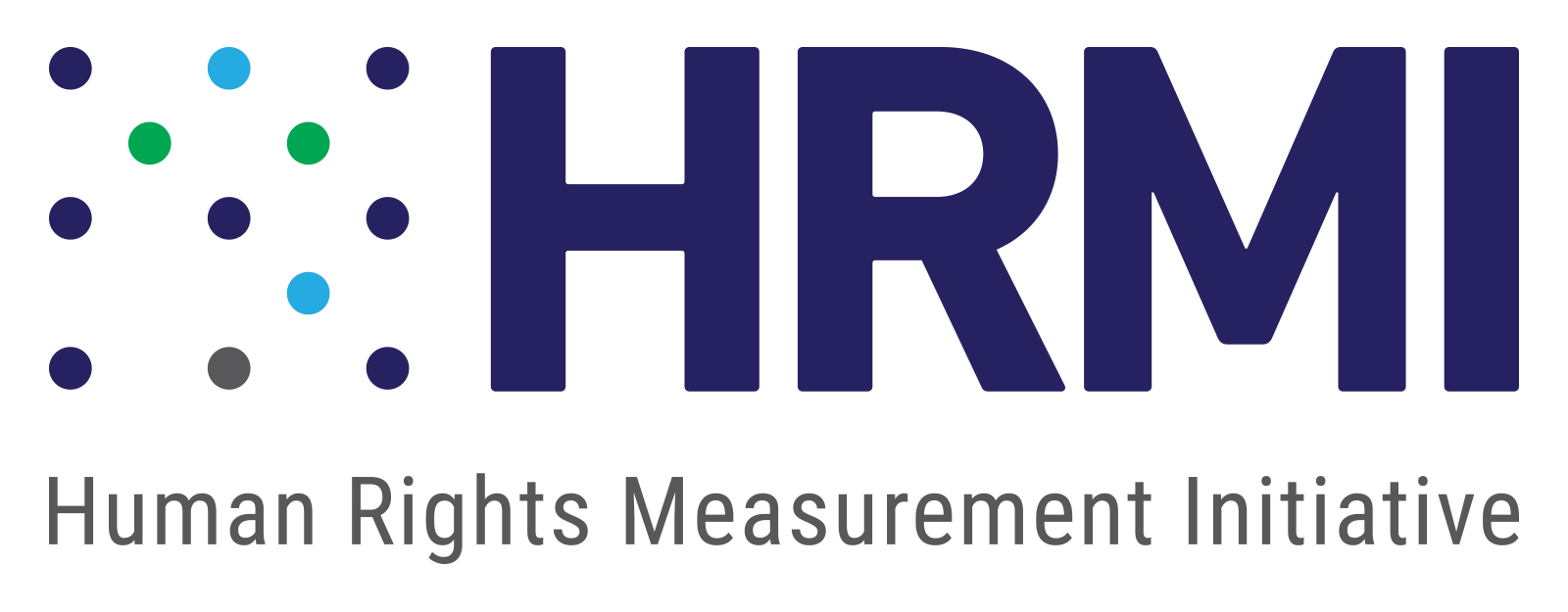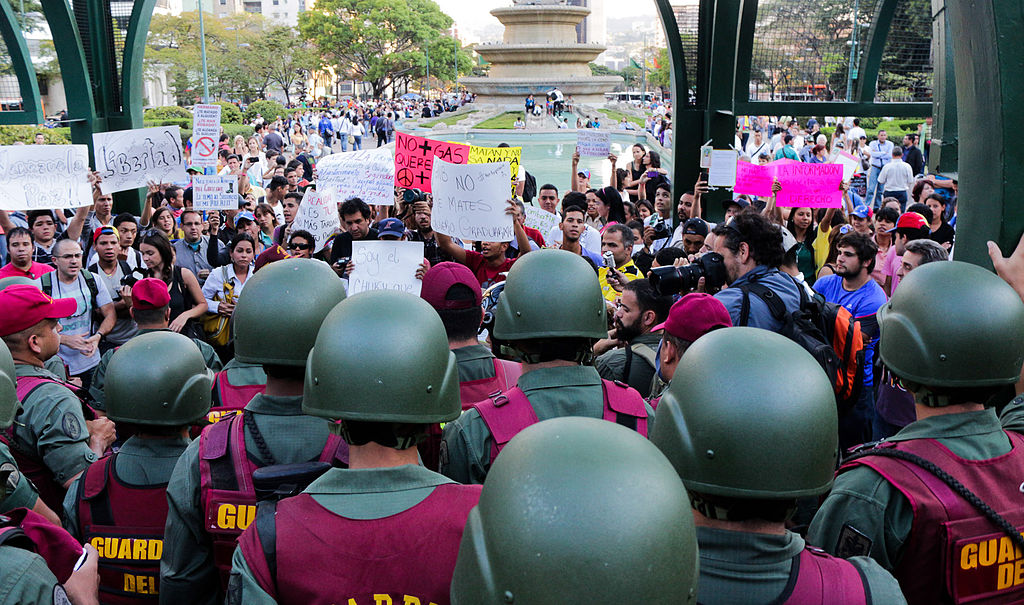Venezuelans do not enjoy political freedoms
This country spotlight refers to data published in 2019. For the most recent data, go to our Rights Tracker.
When the UN released its human rights report for Venezuela last month, the conclusion was damning. The Venezuelan government, headed by Nicolás Maduro, has dug the country into a human rights hole.
In an attempt to hide their transgressions, the Venezuelan government has ‘impose[d] a communicational hegemony by enforcing its own version of events and creating an environment that curtails independent media.’ In other words, the government decides what is real, and persecutes those who have their own versions of reality. To express one’s opinion freely, without any fear of big brother, is a civil and political right that must be upheld if the human rights situation in Venezuela is ever to be improved.
The HRMI Data on Venezuela
The Human Rights Measurement Initiative is a free-to-use online database that measures human rights in countries around the world. These measures are based on surveys given to human rights practitioners. Since Venezuela was one of the nineteen countries measured in 2019, we have up-to-date data on its human rights performance, including the right to freedom of opinion and expression.
Venezuelans do not enjoy political freedoms
Venezuela ranks toward the bottom of all countries for both empowerment and safety from the state. Similar performing countries are Fiji, Mexico, and Mozambique.
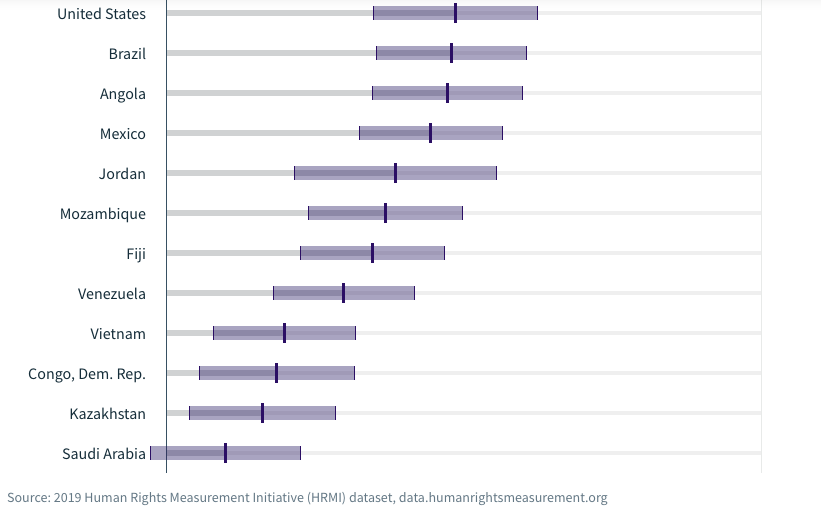
As the graph above shows, Venezuela is the worst performer in the Americas, among the countries HRMI collected data for. What these data make clear is that the state is obstructing the Venezuelan people from voicing their opinions, and as shown by the UN report, from understanding what is real.
HRMI data allow us to make people aware of the situation. These charts and their underlying data sources are free and we encourage everyone to share them. HRMI’s scores provide a transparent and objective measurement of human rights performance. Civil and political rights scores are presented within uncertainty bands, showing the credible range of scores, somewhat like the ‘margin of error’ in opinion polls.
Who is at risk of rights violations?
One of the particularly useful features of the HRMI data is the ‘people at risk’ information, where survey respondents are asked to select from a list which groups of people are most at risk of rights violations. For Venezuela, knowing who is being targeted creates clear pathways for aid and offers insight into the government’s political strategies.
In our civil and political rights data collection, we ask human rights experts which groups they see as being most at risk of having their rights abused or limited. Their answers are represented in word clouds on our data site. Larger type represents a larger number of respondents who said this group was at risk. In the survey, 88% of respondents reported that journalists are at risk for not being able to enjoy the freedom of expression and opinion.
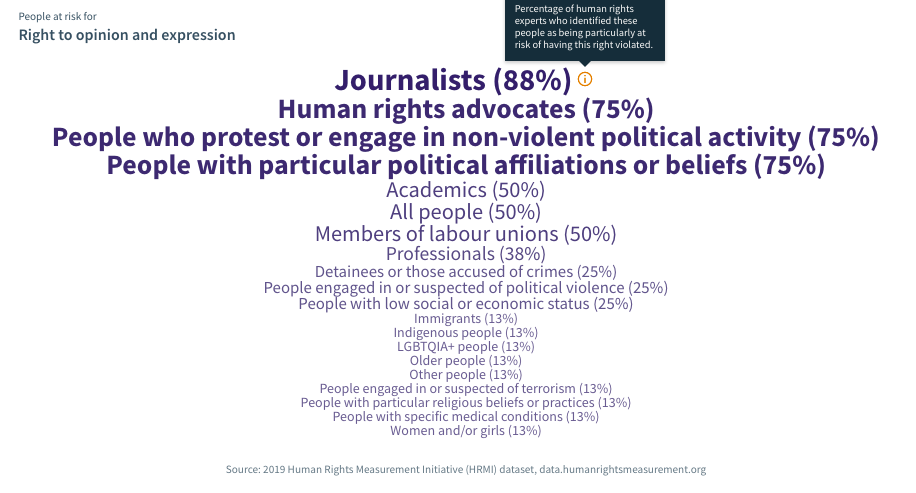
With this information, human rights advocates —who happen to be at high risk themselves— can pinpoint their efforts toward aiding journalists and other high-risk groups. A percentage that high also reinforces the analysis that the Venezuelan government is trying to gain command of the media..
According to a Time report, ‘Venezuelan authorities regularly detain journalists, claiming that they have entered the country illegally or breached “‘security zones’”, or citing a vaguely worded “law against hatred” passed in 2017.’
By persecuting journalists, the state can ensure that Venezuelan citizens do not have access to information, and do not know with certainty what is happening in other parts of Venezuela or around the world. Restricting freedom of opinion and expression means that the Venezuelan government can obstruct any political opposition it might face and thus stay in power. There might be opposition groups trying toact against the government, but no one knows about it because the media is controlled by the state.
There is also an open-ended section in the HRMI survey where respondents can add their views about the groups at risk. These answers are then summarised on HRMI’s data website as in this example below from Venezuela:
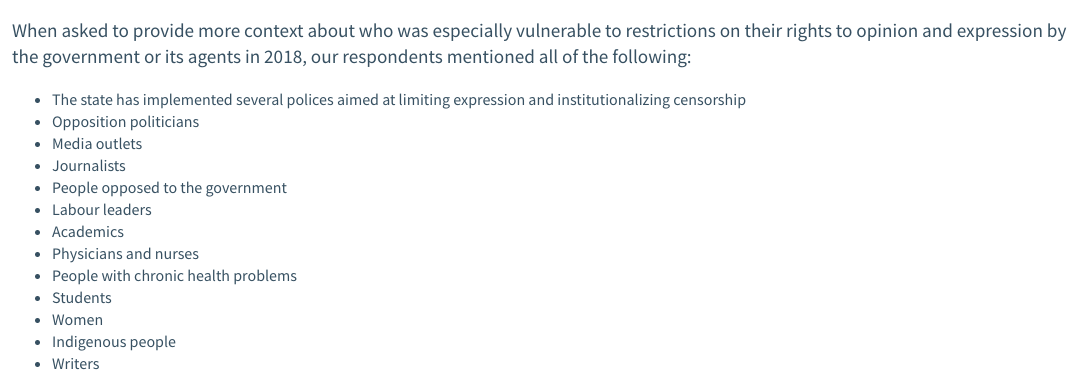
The consistent theme here of censorship and restricted information, is typical of authoritarian governments seeking to stay in power despite clear human rights abuses.
Who can use these data?
All of HRMI’s data are freely available to anyone. You can explore our data site here, and even download the dataset.
We have data on seven civil and political rights: as well as five economic and social rights.
HRMI aims to produce useful data. Some of the people we expect will use our data are:
- Journalists, especially those reporting a particular country, and those focusing on human rights, politics, social issues or international affairs
- Researchers
- Government policy advisers
- Human rights advocates
- NGOs
- Human rights monitors within a region, and at the international level
- Companies, for decision-making, to minimise risk for investors, and direct capital flows ethically.
If you know anyone in those categories, please let them know about HRMI, in case our data can be useful to them.
Valentina Rozo works for De Justicia in Colombia, on cases involving Venezuelan migrants. Listen to her explain how important good human rights data like HRMI’s is for this kind of work in this short video (captions are available):

